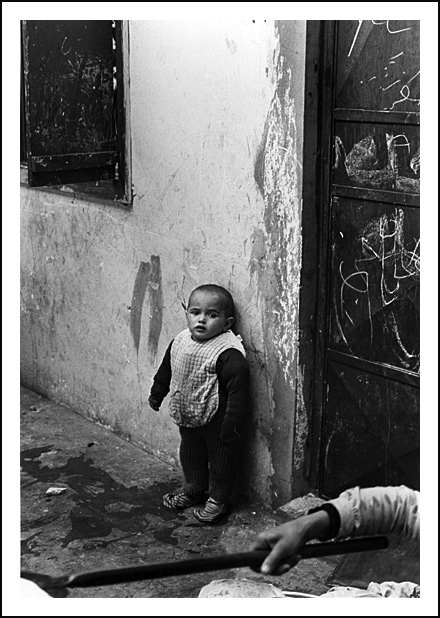
Shateela, 1982 - 1983
Photo: Rosemary Sayigh
|

Shateela, 1982 - 1983 Photo: Rosemary Sayigh |
|
|
and if you don't ask the right questions, people are not going to tell you. Especially not people who have just gone through traumatic loss in which the major powers of the time - the United States, Britain, France, the USSR - supported the establishment of Israel 'on the backs' of the Palestinians. Furthermore it was these governments that dominated the leaders of the newly emerging Arab states, and influential sectors of their public opinion. Palestine had few spokespeople beyond the Mufti, who had been discredited by British, American and Israeli propaganda as an ally of fascism. The Nakbah had scattered nationalist intellectuals in all directions, and it would take some years before they could re-group, and begin to publish. Most ordinary refugees felt that talking about the past wasn't going to help anything. It was better to adapt, earn a living, and put the children in school. There were some, of course, who could not so easily move on. I remember my brother-in-law Tawfiq writing a bitter poem in which he blamed the mother land for deserting her children. There was a group of nationalist students at AUB who held meetings and published leaflets until the Army intervened, shooting one of them. Some thought to continue the struggle by joining the Arab armies to get a military training. But most exiles covered their wounds with silence.
Yet politics was always all around us, whether in Syrian coups, Abdel Nasser's nationalization of the Suez Canal, the British-Franco-Israeli attack on Egypt, or the growing popularity of pan-Arabism. Moreover, all these were related in one way or another to the establishment of Israel and disestablishment of Palestine. In Lebanon the Palestinian issue added to clashes between already militarized groups -- the Christian Kata'eb, the Muslim Najadeh, and the anti-sectarian PPS -- but these were background noise in the middle class pattern of our lives - our work, visits and recreation. The Lebanese state set no barriers to the influx of Palestinian refugees with capital or skills, and allowed them to settle |
anywhere, though early legislation prevented them for exercising the 'free professions': medicine, law, engineering and pharmacy. The state feared left-looking politics --- communism, Ba'thism -- more than a defeated national movement. The treatment of the destitute masses in the camps was of a different order, far more punitive, but this was not general knowledge in the 1950s because of geo-social separation -- refugee camps were a no-man's-land visited by few except charitable women. Shafiq al-Hout, PLO representative (1964- 1982), tells a story of going to one of the camps in the South to address a meeting, and finding no audience. He got together a few children, and through them shamed their parents into joining him.1
From those early days in Beirut, I remember a friend of Yusif's, whose home had been in Jerusalem, listing for me all the household goods - especially the carpets - that he had lost in 1948. It didn't make any real impact on me, perhaps because as a child of World War 2 I could remember newsreels of refugees pouring across Europe. In contrast with those refugees, these seemed in good shape - they had houses, they had clothes, they had incomes. It wasn't until much later that I began to understand their real insecurity, and what had really happened in 1948 to a whole people. The Six Day War of 1967 cracked the illusion of security, changing not just my life but that of thousands of others, forcing me to understand how Israel had been created and Palestinians displaced, pointing me back to a history that up to then I had ignored. Awareness came in different ways and at different moments, never in a single coherent narrative. First, I started to visit Dbeyeh, a refugee camp about 15 kilometers north of Beirut. As pastor, one of Yusif's father's duties was to preach at Dbeyeh. Here there were relatives of Yusif's mother, who was from al-Bassa in northern Palestine. Though Yusif's immediate family had |
|
1. See Sayigh 1979: 133. |
|
Copyright©2005 |
|